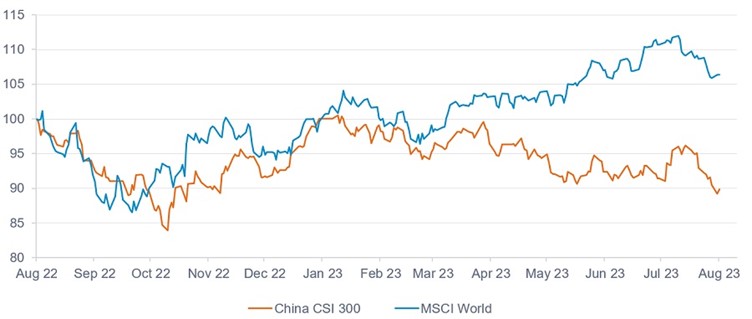China is in the news recently for three reasons.
First, the Chinese stock market has underperformed. Secondly, this underperformance reflects a perception that China has considerable economic challenges. And thirdly, there’s disappointment that the bounce back from Covid has not materialised.
Chinese retail sales increased by just 2.5% in July, slowing from 3.1% in the previous month. It fell short of a forecast 4.5% rise.
Although industrial production was up by 3.7%, it was lower than the prior month’s 4.4% rise. It fell below a forecast 4.4% increase.
And China’s consumer prices fell in the year to July by 0.3%. “The trends in the data are not heading the right way and as expected,” said Tom Stevenson, Investment Director. “It keeps giving investors reasons to pause for thought.”
What’s going on with China’s economy?
Economic growth is slower than people had hoped, and it is increasingly being reflected in forecasts.
Following China’s latest interest rate announcement, economists at Citigroup downgraded their annual growth forecast to 4.7%1 while UBS lowered their forecast to 4.8%. Both fall short of Beijing’s official target of about 5%.
One of the key drivers of the Chinese economy is the property market.
“The property market is weak,” Tom said. “There’s too much supply and house prices are falling. Meanwhile, big companies like Evergrande and Country Garden have either defaulted or are at risk of defaulting on loans.”
He said that China’s likely to be in deflation.
Youth unemployment is also a growing issue. The most recently published data for June showed that the level of unemployment among young people has risen steadily to over 20% and the data is no longer being published.
What action is being taken?
China’s central bank is cutting its interest rates in a bid to spur growth.
Still, the People’s Bank of China is in a bit of a dilemma. “Although they want to cut interest rates, they don’t want to reduce the profitability of banks. They want to avoid this problem. Like many central banks, it is caught between a rock and hard place.”
What has been the impact on investments and markets?

Source: Refinitiv, total returns in local currency from 22.8.22 to 22.8.23, rebased to 100. Past performance is not a reliable indicator of future returns.
The chart tells the story of China’s divergence from broad global financial fortunes. While the MSCI World index has powered ahead from March onwards, rising by more than 6% over the past six months, China’s CSI 300 index has fallen by more than 8%. Since the beginning of last year, the global index has fallen by 10% but China’s benchmark is 25% lower.
Some companies are particularly exposed to the country’s financial health. The slowdown in the property sector is having an impact on commodity groups, for example.
Recently, BHP, the world’s biggest miner by market capitalisation, reported its lowest annual profit in three years2.
The company highlighted the property issues in China and was concerned about the severity of any steel production cuts by Beijing.
It can also impact UK companies. Cambridge-based chipmaker Arm has faced questions over its exposure to China in the run up to its planned list on the New York Stock Exchange.
Arm’s Initial Public Offering (IPO) filing showed that it made a quarter of its revenue from China and warned that it was “particularly susceptible” to economic and political risks.
Fund managers said that there were also fears about the global semiconductor industry, amid souring relations between Washington and Beijing3.
How cheap is China’s stock market after the recent falls?
Marty Dropkin, Head of Equities, Asia Pacific, said that Chinese stocks offer appealing value compared to history and other markets in Asia.
The 1-year forward price-to-earnings (PE) ratio for MSCI China is 10 times versus its 10-year average of 11.4 times. It’s close to the largest discount to the rest of Asia for the past 20 years.
However, caution is warranted.
Marty said that although metrics reveal market valuation and earnings trends, they overlook the dynamics within the Chinese stock market. He said that this diversity highlights the value of active bottom-up investment strategies.
Is the long-term China story still valid?
Although China’s demographic problems have some similarities to Japan and South Korea, it doesn’t discount the fact that the country remains a huge economy.
Although geopolitical concerns will remain on the radar of investors, Tom said that China still has good long-term growth potential.
There are pockets of optimism investors can look forward to. Certain sectors and companies are proving resilient.
Pent-up demand remains among consumers. Trends like experience-based spending, health consciousness and premiumisation continues to grow.
There are signs of recovery in high-end luxury goods. Financials, particularly insurance are also benefiting.
China has an impressive pace of innovation too. Automation opportunities driven by an aging population and the energy transition continues to create interesting investment opportunities. Many of these are part of core industries that are important to the Chinese government.
China may well remain a fertile ground for the investment over the long-term. An expanding middle class, rising incomes and technological innovation may well fuel growth.
